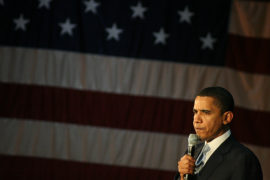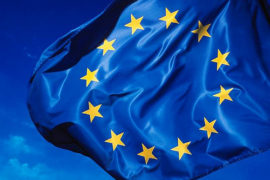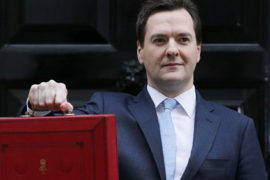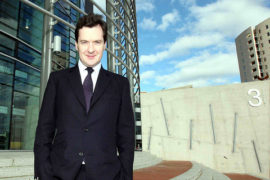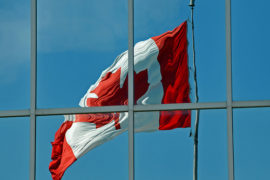An earlier blog noted that the first part of Nick Robinson’s series Europe: Them or Us had presented an account of the development of the EU that had badly distorted history by placing wrong emphasis in its role as a force for peace, and had amplified EU propagandists by projecting Winston Churchill as a warrior for a United Europe and thus as the ‘father’ to today’s EU. What has now emerged as a result of further digging is something a whole lot murkier.
An initial negative is that it is now clear that Robinson’s first programme was not at all original. It was actually a re-hashed version of the BBC’s 1996 series The Poisoned Chalice. Robinson’s primary role was simply to re-voice that earlier commentary so that it sounded new. Should he have told viewers about this? That he did not is at best disingenuous…at worst downright misleading, passing off old goods for brand new.
Further analysis of the transcripts (h/t Craig Byers – plus a senior academic who did her PhD on The Poisoned Chalice) also shows that Robinson is guilty of something far more serious: he doctored some of the original commentary to make it fit with EU’s hagiography about its formation.
An important factor to note is that the original programme was itself deeply biased. The Poisoned Chalice chose as its start point the arresting concept that perhaps the ultimate embodiment of British patriotism, Winston Churchill, was an early enthusiast for ‘the idea of European union’.
Michael Elliott (presenter): There was a time, not so long ago, when Britain welcomed the idea of European union. In June 1940 London was bracing itself for the fall of France to the Nazis. General Charles de Gaulle came to London to put an astonishing rescue plan to Winston Churchill: Britain and France should unite as a single nation.
Robert Makins (Foreign Office, 1940): When he arrived he was taken straight into the cabinet room and, of course, we we all agog to know what it was all about, and we were afterwards informed that he had come over with a proposal that there should be a union between France and Britain. with common citizenship.
Michael Elliott: The scheme had been dreamed up by Jean Monnet, a civil servant who would later become the Father of the European Community.
Jean Monnet (reading from his draft declaration): The government of the United Kingdom and the French Republic make this declaration of indissoluble union. Every citizen of France will enjoy immediately citizenship of Great Britain. Every British subject will become a citizen of France.
Michael Elliott: Monnet’s draft was agreed in a hurry by Churchill and the war cabinet, with one prophetic proviso. They couldn’t stomach his proposal for a single currency. In any case, it all came to naught. The French cabinet turned down Monnet’s plan a few hours later.
The message could not be clearer. Churchill, as long ago as 1940, was advocating a form of ‘European union’. Elliott did not say ‘the’ European Union, of course, but there could be no doubt what he was implying; the man who had saved Britain from the Nazis was working in the darkest days immediately after Dunkirk towards the formation of a supra-national European body that would include from the start the United Kingdom. Nick Robinson in his programme took this even further. His commentary closely echoes that of Elliott, but he made important changes. He said:
‘This wonderful treasure trove of interviews with the key decision-makers filmed 20 years ago, many of whom of course are no longer with us, gives us a real insight into the decision that we now face.
There’s one interview we haven’t got, it’s with the man who in many ways was the father of a united Europe. No, he wasn’t a Frenchman, he wasn’t a German, he wasn’t a Belgian, he was, in fact, the British Bulldog himself, Winston Churchill.
In the desperate days of June 1940, Britain’s new wartime leader’s first instinct was to go for full political union, quite unthinkable today. Churchill’s plan, in a last-ditch effort to stop France falling to the Nazis, was that Britain and France would become a single country, an indissoluble union with one war cabinet running defence and the economy on both sides of the Channel.
The British Cabinet backed it, but with one prophetic exception, they simply couldn’t stomach the idea of a single currency. Days later France fell, and with it, at that stage, the idea of political union.’
This was the bedrock of the programme that followed: Churchill, the saviour of the country, was dreaming of a United Europe in Britain’s darkest hour. Nick Robinson’s embellishment of Elliott’s already deeply skewed analysis took it many steps further. Churchill was baldly and without doubt ‘in many ways the father of a United Europe’, the implication being that it was on this momentum the project was built.
In order to show how risible – and deeply skewed – this interpretation is, the genesis and handling of the ‘Frangleterre’ idea needs unpicking. It was born in June 1940 after Dunkirk fell and as the Nazi Blitzkrieg was heading towards France. The French cabinet was panicked and divided; prime minister Reynaud wanted resistance to continue while figures such as Petain were contemplating suing for ‘peace’. In this fearsome crucible, de Gaulle spoke to Jean Monnet (widely seen as the ‘father’ of the Treaty of Rome), who was then working in London with the War Cabinet on the North Atlantic supply route. Monnet had been developing ideas of a supra-national European Union for at least two decades, and he proposed a daring plan: Franco-Anglo unification to facilitate fighting on. De Gaulle decided he would put the idea to Churchill. Churchill himself was deeply cynical, but he had only recently become prime minister and knew that because it had come from de Gaulle, he must put it to the War Cabinet as a whole. That happened the following day, and much to Churchill’s surprise, it was accepted as a possible way forward. Two provisos were added – that it would only be for the duration of the war, and there would be no unification of currencies. De Gaulle then took the proposal back to the French cabinet. It was rejected almost immediately. The reality was that many ministers believed the invasion of Britain by Hitler was only months away, and they were deeply angry at what they saw as the British collapse at Dunkirk. In the discussions that followed, Reynaud resigned and Petain took his place; within days the French cabinet was suing for peace with the Nazis. Petain later dismissed the de Gaulle plan as the equivalent of ‘strapping France to a rotting corpse’.
The reality is that the ‘Frangleterre’ idea never stood the remotest chance of being accepted, and even if it had been, would have been only for the duration of the battle to defeat the Nazis. Robinson projected, in suggesting that it was the root of European integration – a provocative, deliberate, one-sided view of history. It is impossible to tell what was actually in Churchill’s mind in 1940 as the country he loved with a passion appeared to be rapid collapse towards Nazi domination. The paper trail left behind suggests that the War Cabinet backing of this half-baked Monnet plan for ‘Frangleterre’ was based only on expediency, and consider-all-options – however potty – desperation. Dunkirk had fallen; the horrors of the Nazi Blitzkrieg had been unleashed towards France and the United Kingdom, and both the British War Cabinet and de Gaulle were prepared to look at any options to prevent both invasion and the formidable might of the French navy falling into Nazi hands.
Is there any basis for Robinsons claims in what happened subsequently? After the war, Churchill, of course, made several speeches which pro-EU figures, political parties and organisations – including especially the EU itself- have claimed also showed that he wanted a ‘United Europe’, for example in Zurich in 1946. He most certainly did want a form of unification and proposed the especially brazen idea (in the context that a merciless war was only just over) that at its heart should be an alliance of France and Germany. But there are two very important caveats in the equation that firmly disqualify his ideas as footsteps towards the formation of the actual European Union. First is that Churchill never envisaged that the UK would be part of such as scheme. He made it very clear that the United Kingdom’s primary allegiance was with the Commonwealth and the ‘Anglosphere’, the United States especially. He never thought the UK would become a full member. Second, as the post-war dust began to settle, it became clear that the biggest threat to world peace was Russia’s annexation of numerous European states – especially Czechoslovakia – and its hostility to the values of the ‘West’. Churchill wanted a European ‘Union’ primarily as a bulwark against this. He saw the concept as a component of hard-headed diplomacy in a world that, as the 1940s drew to a close, seemed yet again on the brink of war. His ideas, insofar as he wrote them down, were not based on ideology linked to Monnet’s desire for ‘ever closer union’ but political practicalities.
A final point to take into account is an issue of hindsight. Of course what became he EU did have its roots in the 1930s and 1940s. But no-one knew at that time what it would become, including Churchill. He was pushing the concept of ‘united Europe’ with no firm grasp of what it would be. In the event, the ideas that led to its foundation did not come from his concept of unity at all, but those – as was pointed out in an earlier News-watch blog – by figures such as the British civil servant Arthur Salter and the French businessman-turned-politician Jean Monnet. And in their plans, the driving force was a supra-national Commission which would take from each country most of the law-making powers and sovereignty, and be answerable only to what it saw as the greater good of ’Europe’ – as defined by itself.
In fact, no one envisaged what a United Europe could look like – and it did not become a practical possibility – until the Treaty of Rome was signed in 1957. Proof of this is that the year before, the French prime minister, Guy Mollet, resurrected the idea of a France-UK union and put it formally to his British counterpart, Anthony Eden. The proposal was triggered because France was desperate after the Suez crisis and saw such a move as its economic salvation. The proposal was kept secret until 2007 with the release of British cabinet papers.
In that overall context, it was doubly wrong of Nick Robinson to select the 1940 ‘Frangleterre’ idea as evidence that Churchill was the ‘father’ of a united Europe. First, because in 1940 the plan was based not on EU-related ideology, but desperate expediency. And second because the ideology on which the EU was founded was nothing at all to do with Churchill: the ideas were rooted in the supra-nationalism advocated by such figures such as Jean Monnet.
Nick Robinson is a former BBC political editor. It is deeply troubling that he should project such bias, at any time – but especially during the EU referendum. It seems that he deliberately chose to amplify the ‘Churchill is father of European unity’ concept. Clearly, no one at the BBC can see that bias. It is evidence of a deep institutional pro-EU mindset.
Photo by INTVGene 





